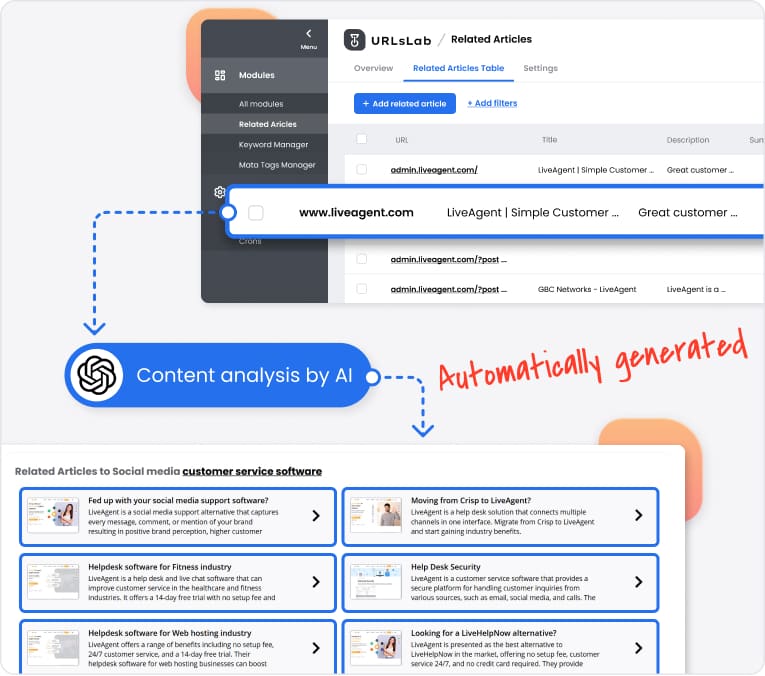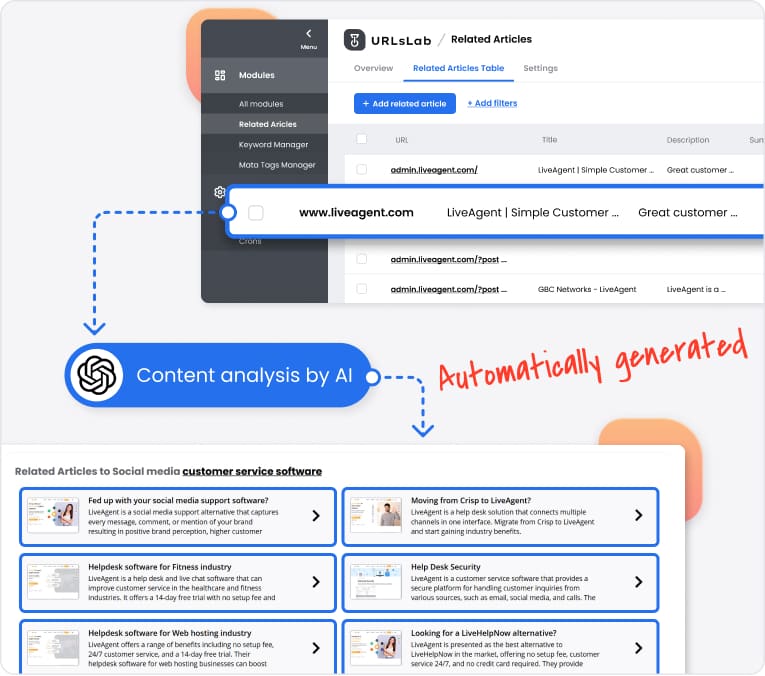What Are Related Articles
Related articles connect users to additional content, improving SEO, user engagement, page relevance, and helping businesses build authority while enhancing the overall website experience.

Related articles
- Purpose of including related articles
- Types of related articles
- Increasing user engagement with related articles
- Improve the user experience on your site
- Boost time spent on a page
- Encourage social sharing
- On-page SEO benefits of related articles
- Optimal keyword usage
- Strategic anchor text selection
- Improved content discovery
- Increasing page relevance
- Fostering topic clusters
- Implementing and optimizing related articles
- Usage of relevant and contextual topics
- Incorporating AI and machine learning tools
- Updating and refreshing article link lists
- FAQ
- What is the purpose of related articles?
- How do related articles improve SEO?
- What are the best practices for related articles?
- How can AI tools enhance related articles?
- What to consider when updating article link lists?


Related articles are an essential aspect of SEO and user experience enhancement, as they offer additional value to online users and contribute to a website’s ranking on search engine result pages (SERPs). Bringing together related content improves user engagement and offers businesses the opportunity to keep consumers on their websites, discovering more engaging content and gaining a deeper understanding of the topics at hand. This, in turn, augments a company’s credibility and positions it as a reliable leader in the field.
What are related articles?
These are strategic pieces of content designed to help website visitors discover additional valuable information that aligns with their search terms or interests. Providing a more comprehensive understanding of the subject matter, related articles extend the topic covered naturally. As a result, businesses can effectively boost user engagement, expand their reach, and establish their brand as thought leaders in their respective industries.
Purpose of including related articles
SEO and website optimization depend on related articles to enhance user experience and improve visibility on search engines. Additionally, they decrease bounce rates and increase click-through rates by providing more relevant information. Related articles create a comprehensive knowledge base, attracting organic traffic and addressing various search terms within the content.
Types of related articles
Related articles are an essential component of a well-structured content strategy for businesses, as they provide recommendations for further reading on related topics. This enables readers to delve deeper into certain subjects and enhances user engagement. There are various types of related articles, such as Related Posts, which suggest blog entries relevant to the current topic, or Related Products, which showcase items that are similar to the ones being viewed at the moment.
Increasing user engagement with related articles
Related articles are an essential tool for increasing user engagement on a website, as they keep users browsing and interacting with your website for an extended period. These articles delve deeper into the same topic or cover relevant topics within your article content, making it easier for users to navigate through related information on your site and discover more search terms that interest them. By presenting intriguing, well-written, and related articles alongside the current topic, website owners can significantly boost the chances of their visitors consuming multiple individual articles at a single visit.
In addition to providing a richer and more satisfying user experience, displaying related articles is also crucial for enhancing your website’s Search Engine Optimization (SEO) and securing higher Google rankings. Google and other major search engines analyze the article body to understand relationships between content pieces, which plays a vital role in determining your website’s relevance and rankings. Furthermore, integrating related articles can increase the knowledge base of your website and make it a valuable information hub on a specific subject or niche.
To optimize this approach, it is essential to measure and maintain a score between articles that reflects the strength of their relationship. Including these connections will allow users to access additional articles within your website, effectively increasing the time spent on it and broadening the user’s understanding of the topic. Overall, carefully curating article relationships is a surefire way to build a more engaging website and improve your online presence, rankings, and reputation.
Improve the user experience on your site
Grouping related articles on a website significantly improve user experience, making it easier for users to navigate and find information. This process involves analyzing individual articles’ topics, content, and relevant search terms to create meaningful connections between them.
By displaying linked articles alongside the current topic, users can seamlessly transition between contents, increasing user engagement. To determine the strength of article relationships, a score between articles is generated based on factors like relevance, similarity, and popularity.
Incorporating related articles and comprehensive knowledge base access, website owners ensure that users can quickly find answers, improving user experience and establishing their business as a reliable, authoritative resource.
Boost time spent on a page
Related articles are an effective strategy to reduce bounce rates and increase user engagement as they provide users with additional, relevant content suggestions while they are browsing a website. By offering content that is related to the topics being searched or the article content being consumed, website owners can encourage users to spend more time on their site. Relevant topics are determined by analyzing the user’s search terms, the current topic being viewed, and the individual articles’ content. This approach allows website owners to create article relationships within a knowledge base, ensuring that a comprehensive network of related information is accessible to users.
Encourage social sharing
By utilizing article relationships, businesses can enhance their content with features that encourage reader exploration and foster greater discussion and knowledge sharing. This ultimately leads to more shares on social media platforms and increased traffic to your website. Creating a highly engaging environment that promotes this both within the website and on social media platforms can be achieved by strategically incorporating article links and features like related resources, suggested readings, or even user-generated content. In turn, this widespread sharing and endorsement of content can contribute to a strong brand reputation and drive business growth.
On-page SEO benefits of related articles
Related articles play a crucial role in enhancing a website’s on-page SEO and improving its rankings on search engine results pages. By linking individual articles covering similar or relevant topics, you create a network of article relationships that effectively provides search tips for search engines like Google, making it easier for them to index your content and match it to search terms relevant to your niche. Incorporating additional articles on your current article page not only increases the dwell time of your audience but also establishes your website as an authority in your field, subsequently boosting your website’s rankings.

Optimal keyword usage
Related articles boost a website’s SEO by using optimal keywords and enhancing user engagement. They support a cohesive content network, increase organic traffic, and improve search ranking. Content creators should conduct keyword research and integrate them into interconnected articles for better user experience and SEO performance.
Strategic anchor text selection
Related articles play a vital role in establishing strategic anchor text selection to enhance website authority and user search relevance. By analyzing the current article and identifying related search terms, you can create content that targets relevant topics and optimizes user engagement. Search tips, like focusing on common queries or analyzing competitor content, aid in developing a cohesive list of interconnected articles. Building article relationships through strategic anchor text improves user experience and search engine visibility, making your website a trusted authority within your niche. Thus, incorporating related articles significantly strengthens a website’s online presence and usability.
Improved content discovery
The content discovery on websites is enhanced by related articles that point users to relevant content based on their interests. By connecting the current article to related pieces, users can easily access additional resources on pertinent topics. Using search tips, such as strategic keywords, improves navigation efficiency. Offering a list of thematically related articles fosters user engagement, encouraging exploration of the platform’s resources. By implementing related articles, website visitors can seamlessly explore various aspects of a topic, allowing business owners to optimize content reach and user experience.
Increasing page relevance
Using related articles enhances page relevance for search engine rankings by creating strong article relationships and covering various aspects of a topic. This strategy ensures comprehensive coverage of relevant keywords and search terms, making your content more informative for users seeking information or recommendations. Including related articles and search tips within your content improves page engagement, which in turn boosts search engine rankings. Furthermore, featuring multiple articles on related topics helps establish your website’s authority, enabling your content to stand out among competitors.
Fostering topic clusters
Utilizing related articles to foster topic clusters improves a website’s hierarchical structure and rankings. By grouping a current article with others covering related search terms and subjects, article relationships are established, enriching user experience and helping the website rank higher for targeted terms. A well-organized list of articles, categorized by topics, aids user navigation. Implementing these practices results in better rankings, attracting a larger audience, and ultimately benefiting the business owners.
Implementing and optimizing related articles
To implement and optimize related articles on your website, start by analyzing the current article’s search terms and content for relevant topics. Use search tips and analytics data to understand the audience’s interests, and compile a list of related articles. Establish article relationships based on thematic relevance and similar search terms, organizing them in a visually appealing manner. Implement an algorithm that dynamically updates the list and monitors website analytics to evaluate performance, adjusting content as needed to improve user engagement and satisfaction.
Usage of relevant and contextual topics
In the digital world, using relevant and contextual topics is crucial for improving the user experience and increasing a website’s relevance to user searches. By incorporating current article content with relatable topics, businesses can optimize their website to rank higher on search engine results pages. Implementing search tips, such as including popular search terms, allows users to effortlessly navigate through a list of articles tailored to their needs. Establishing article relationships, which connect related articles and topics, ensures that users engage with a variety of content for a more comprehensive experience. Additionally, grouping similar articles under the same category or topic allows businesses to establish themselves as thought leaders in their industry. Ultimately, understanding and focusing on relevant and contextual topics can significantly boost the overall experience for users, leading to increased user retention and higher search engine rankings.
Incorporating AI and machine learning tools
AI and machine learning significantly optimize related articles, improving user experience and boosting SEO. By analyzing content, these tools identify keywords, streamline search tips, and generate related article lists. Machine learning examines article relationships to provide pertinent and informative content. The URLs Lab utilizes these technologies to improve relevant articles and SEO performance, engaging readers and driving traffic. Implementing AI and machine learning strategies enhances user satisfaction and SEO results.
Updating and refreshing article link lists
Regularly updating the related article links list is crucial for maintaining article relevance and increasing their perceived value. This enhances user experience, improves SEO performance, and provides better exposure to your target audience. URLs Lab is a great example of how refreshing link lists can boost SEO and foster increased engagement and organic growth for your business.
FAQ
What is the purpose of related articles?
The purpose of related articles is to provide readers with additional, relevant information on a specific topic or theme, which can help them gain a deeper understanding of the subject matter, explore different perspectives, and discover connections between various ideas.
How do related articles improve SEO?
Related articles improve SEO by increasing user engagement, reducing bounce rates, and showcasing a website’s authority and relevance on a specific topic. This creates a positive user experience, which search engines reward with higher rankings.
What are the best practices for related articles?
The best practices for related articles include choosing articles with strong relevance to the main topic, ensuring the content is up-to-date and reliable, and linking to articles with high-quality, authoritative sources.
How can AI tools enhance related articles?
AI tools can enhance related articles by analyzing the content, context, and keywords to recommend more relevant and personalized suggestions. Additionally, they can continuously learn and refine their recommendations based on user engagement and feedback.
What to consider when updating article link lists?
Frequently asked questions
- What is the purpose of related articles?
The purpose of related articles is to provide readers with additional, relevant information on a specific topic or theme, helping them gain a deeper understanding, explore new perspectives, and discover connections between ideas.
- How do related articles improve SEO?
Related articles improve SEO by increasing user engagement, reducing bounce rates, and showcasing your website’s authority and relevance on a topic. This results in positive user signals, which search engines reward with higher rankings.
- What are the best practices for related articles?
Best practices include selecting articles with strong relevance, ensuring content is current and reliable, and linking to high-quality, authoritative sources.
- How can AI tools enhance related articles?
AI tools can analyze content, context, and keywords to recommend more relevant and personalized related articles. They can also refine recommendations based on user engagement and feedback.
- What to consider when updating article link lists?
Regularly refresh related article links for ongoing relevance and SEO value. Ensure the list includes the most up-to-date, high-quality, and contextually appropriate articles for the best user experience and improved search rankings.
Enhance Your Website with Related Articles
Discover how integrating related articles can boost your SEO, increase user engagement, and establish your website as an authority in your industry.


